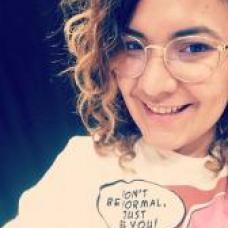Meet Aby Rodriguez, an Amgen Biotech Experience Alumni

ABY RODRIGUEZ
Senior Associate of Supplier Management in the Human Tissue category at Amgen
Amgen Biotech Experience Year: 2007
How the Amgen Biotech Experience (ABE) Shaped My Educational & Professional Path
Eleven years ago, Aby Rodriguez participated in a life-altering experience. A student at CROEM, a public boarding school in Puerto Rico that specializes in science and math, Rodriguez conducted biotech experiments for the first time through the Amgen Biotech Experience (ABE).
“Before these labs, I had never heard of biotech. I knew there were scientists somewhere in the world trying to find cures for diseases, but I didn’t know what that work looked like,” she says. It would forever change her path, leading Rodriguez to pursue a degree in microbiology and chemistry at the University of Puerto Rico, and then a master’s degree in molecular, cellular, and developmental biology at the University of Michigan, Ann Arbor.
Her extensive lab research throughout her education, paired with bench work after school, eventually led her to Amgen as a senior associate, managing relationships with suppliers for human tissue and clinical biomarkers (diagnostic tools). “My work at Amgen is fast-paced and dynamic,” she says. “It requires me to be able to track many moving parts, to explore possible solutions, and to help identify the best options, ultimately, to better serve patients.”
My ABE Highlights
What did you enjoy most about ABE?
I remember getting to biology lab my freshman year of undergrad, after having completed the ABE labs in high school, and feeling very comfortable with the tools and projects. Thinking back, I’m pretty sure this was the first time we all felt like scientists, every group in my class was very engaged, we all enjoyed wearing our lab coats and we all took it very seriously. At the end of each experiment, everyone wanted their work to be precise and to see obtain good results.
Talk about the hands-on lab experience. Did you feel like a real scientist? How did ABE compare to your experience in other science classes you’d taken?
The ABE labs were my first exposure to molecular biology, from pipetting to learning how to open and close Eppendorf tubes. I remember the first time we attempted a transformation, we couldn’t grow anything! But as good “junior scientists,” we were so excited to figure out what didn’t work and what we could do better. My high school specializes in math and science, but the main labs provided by the school were chemistry and physics. The ABE labs allowed students interested in medicine and biotech to get exposed to processes we wouldn’t have otherwise gotten a chance to explore at that young age. These courses and labs powered by ABE, paired with a very passionate teacher, shaped many biology, biotech, and medical professionals at my school. By the time I made it to graduate school, and it was my turn to teach students transformations, I realized how lucky I was to have had this experience while in 9th and 10th grade because a lot of my students in freshman year of college weren’t even familiar with pipetting.
Did ABE help you look at science in a new way? Did you have a sort of ‘ah-ha’ moment during the labs? Tell me about it.
ABE helped me understand a very important part of science: failure. If the experiments didn’t work, we’d brainstorm what could have gone wrong. In my opinion, that is the true scientific method. Learning how to fail, going back to the drawing board, figuring it out, tweaking here and there. When I made it to a research lab my first year of undergrad I was familiar with failure, and my mess-ups those first couple of times didn’t deter me from keeping on. We also learned lab safety and its importance in ABE. Learning this early on makes lab safety second nature when inside a lab.
What was your biggest takeaway from ABE?
ABE sparked my curiosity and paired with a fantastic teacher the program propelled, not just my career but the career of many. Mrs. Cabrera is still influencing young scientists and teachers like her struggle to find the right resources to serve their students. I am glad she was aware of this program and she received all the help she did from ABE. Because of that, she was able to shape the lives of a lot of students, inspiring us to pursue careers in fields that otherwise we wouldn’t have been exposed to that early on.
To learn more, visit http://www.amgenbiotechexperience.com and follow @AmgenFoundation.

